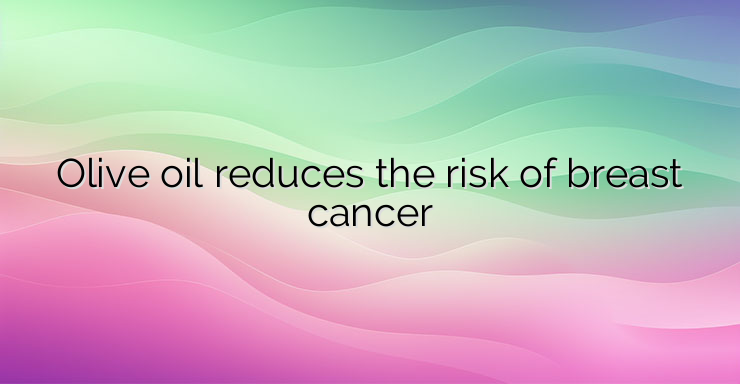Women who consume olive oil for cooking, as well as those who add two or more tablespoons of olive oil per day to their diet, have a 30% lower risk of developing breast cancer than women who do not usually consume olive oil. This was established by a study published in the international journal European Journal of Clinical Nutrition, on the relationship between lifestyle and the risk of breast cancer, promoted by the GEICAM Research Group on breast cancer – GEICAM. Moderate consumption of extra virgin olive oil is associated with a lower incidence of breast cancer. Olive oil contains substances with a protective effect against this tumor, many of which are lost during the fat refining process, explains Dr. Marina Pollan, director of the National Epidemiological Center of the Carlos III Health Institute. Olive oil is high in monounsaturated fats, especially oleic acid. It also contains vitamin E, polyphenols and lipid molecules that give it anti-inflammatory and antioxidant properties. Antioxidants protect cells from the oxidation process caused by free radicals. Regarding inflammation, cancer cells are known to take advantage of the inflammatory environment to proliferate. Reducing the risk of breast cancer This new analysis of the EpiGEICAM study evaluated the inclusion of different types of fat – olive oil, virgin olive oil, sunflower oil, corn or soybean oil, margarine and butter – in the diet of a group of women with breast cancer and others without a diagnosis disease. The results showed that consuming extra virgin olive oil for seasoning, frying or cooking, added to the intake of two tablespoons of raw olive oil, reduced the risk of breast cancer by 28%. Consuming extra virgin olive oil, especially in salads or with raw vegetables, has a protective effect against breast cancer, but its consumption should not be excessive, as other studies have shown a link between high caloric intake and an increased risk of breast cancer , explains Dr. Pollan, co-coordinator of the GEICAM Working Group on Preventive Treatments, Epidemiology and Hereditary Cancer and a member of the GEICAM Board of Directors. Moderate consumption Obesity increases the risk of breast cancer by between 20 and 40%. Excess adipose tissue increases estrogen levels, and an excess of this hormone has a toxic effect on mammary gland cells. It also promotes insulin resistance. The protective properties against breast cancer are observed with the consumption of extra virgin olive oil. Standard extra virgin olive oil is obtained by a mechanical process and no additives are added. The difference is that the olive oil is not cold-pressed and is milled within 24 hours of harvest. Virgin olive oil is also extracted by mechanical processes. Refined olive oil is virgin olive oil that has undergone a series of physical and chemical processes to remove its taste and smell.In the last part of the process, virgin olive oil is added to give it some flavor. In terms of its nutritional composition, refined olive oil has a lower proportion of polyunsaturated or essential fatty acids, which our body needs but cannot produce on its own and must be taken in through food. Sources: https://www.sabervivirtv.com/oncologia/aceite-oliva-virgen-reduce-riesgo-cancer-mama_6963 https://www.nature.com/articles/s41430-022-01101-w


Leave a Reply